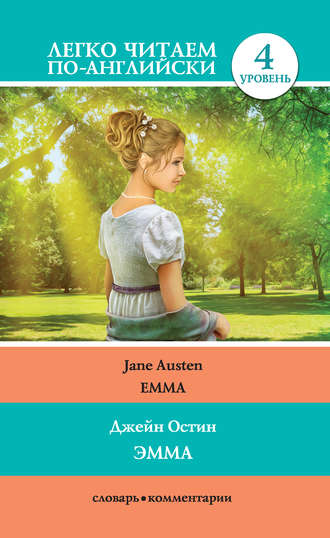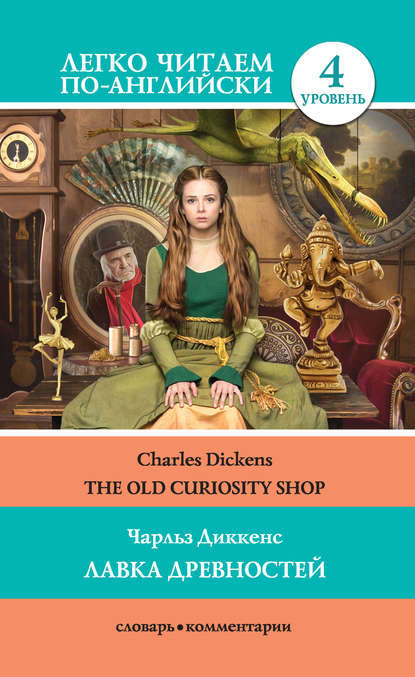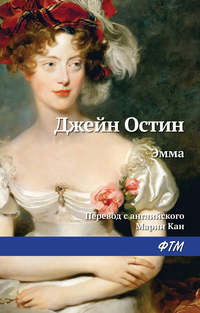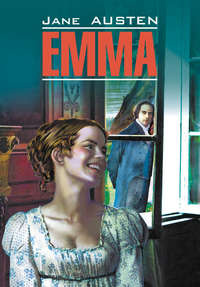
Полная версия
Эмма / Emma
“Emma has been meaning to read more ever since she was twelve years old. So what? You never could persuade her to read half so much as you wished. You know you could not.”
“I dare say,” replied Mrs. Weston, smiling, “since we have parted, I can never remember Emma’s omitting to do anything I wished.”
“Emma is spoiled by being the cleverest of her family. At ten years old, she had the misfortune of being able to answer questions which puzzled her sister at seventeen. She was always quick and assured: Isabella slow and diffident. And ever since she was twelve, Emma has been mistress of the house. She inherits her mother’s talents.”
“I should have been sorry, Mr. Knightley, to be dependent on your recommendation, had I quitted Mr. Woodhouse’s family and wanted another situation; I do not think you would have spoken a good word for me to anybody. I am sure you always thought me unfit for the office I held[36].”
“Yes,” said he, smiling. “You are better placed here; very fit for a wife, but not at all for a governess. But you were preparing yourself to be an excellent wife all the time you were at Hartfield. You might not give Emma such a complete education as your powers would seem to promise; but you were receiving a very good education from her; and if Weston had asked me to recommend him a wife, I should certainly have named Miss Taylor.”
“Thank you. There will be very little merit in making a good wife to such a man as Mr. Weston.”
“But about Harriet Smith. I think her the very worst sort of companion that Emma could possibly have. She knows nothing herself, and looks upon Emma as knowing everything. She is a flatterer. Her ignorance is flattery. And as for Harriet, I will venture to say that she cannot gain by the acquaintance. She will grow just refined enough to be uncomfortable with those among whom birth and circumstances have placed her home.”
“Mr. Knightley, with all dear Emma’s little faults, she is an excellent creature. Where shall we see a better daughter, or a kinder sister, or a truer friend? No, no; she has qualities which may be trusted; she will never lead anyone really wrong.”
“Very well; I will not plague you any more. Emma shall be an angel.”
“I know that you all love her really too well to be unjust or unkind; but excuse me, Mr. Knightley, if I take the liberty of hinting, it’s better not to speak about Harriet Smith’s intimacy.”
“Yes, of course, it is very good advice, but I have a very sincere interest in Emma. There is an anxiety, a curiosity in what one feels for Emma. I wonder what will become of her!”
“So do I,” said Mrs. Weston gently, “very much.”
“She always declares she will never marry, which, of course, means just nothing at all. But I have no idea that she has yet ever seen a man she cared for. It would not be a bad thing for her to be very much in love with a proper man. I should like to see Emma in love, and it would do her good. But there is nobody hereabouts to attach her; and she goes so seldom from home.”
Chapter VI
Emma was quite convinced of Mr. Elton’s being in the fairest way of falling in love, if not in love already. He talked of Harriet, and praised her warmly. His perception of the striking improvement of Harriet’s manner, since her introduction at Hartfield, was one of the proofs of his growing attachment.
“You have given Miss Smith all that she required,” said he; “you have made her graceful and easy. She was a beautiful creature when she came to you, but, in my opinion, the attractions you have added are infinitely superior to what she received from nature.”
“I am glad you think I have been useful to her; but Harriet had all the natural grace of sweetness of temper and artlessness in herself. I have done very little. I have perhaps given her a little more decision of character.”
“Exactly so; so much superadded decision of character!”
Emma was not less pleased another day with the manner in which he seconded a sudden wish of hers, to have Harriet’s picture.
“Did you ever sit for your picture, Harriet?” said she.
“Oh! dear, no, never,” answered Harriet. “Why should my picture be drawn?”
No sooner was she out of sight, than Emma exclaimed,
“What an excellent picture of her would be! I would give any money for it. You do not know it I dare say, but two or three years ago I had a great passion for painting. And I could almost venture, if Harriet would sit to me. It would be such a delight to have her picture!”
“Oh, yes,” cried Mr. Elton; “it would indeed be a delight, Miss Woodhouse, to exercise so charming a talent in favour of your friend.”
“But I am afraid, Mr. Elton, Harriet will not like to sit. She thinks so little of her own beauty. Did not you observe her manner of answering me? ‘Why should my picture be drawn?’”
“Oh! yes, I observed it, I assure you. But still I cannot imagine she would not be persuaded.”
Harriet was soon back again, and the proposal almost immediately made. Emma wished to go to work directly. She had soon fixed on the size and sort of portrait. It was to be a whole-length in water-colours.
The sitting began; and Harriet, smiling and blushing, presented a very sweet mixture of youthful expression to the steady eyes of the artist. But Mr. Elton was fidgeting behind her and watching every touch. So Emma requested him to place himself elsewhere. It then occurred to her to employ him in reading.
Mr. Elton was happy to read aloud. Harriet listened, and Emma drew in peace. The sitting was altogether very satisfactory; Emma was quite enough pleased with the first day’s sketch to wish to go on. Harriet was to sit again the next day; and Mr. Elton entreated for the permission of attending and reading to them again.
“By all means[37]. We shall be most happy to consider you as one of the party.”
The whole progress of the picture was rapid and happy. Everybody who saw it was pleased.
“Miss Woodhouse has given her friend the only beauty she wanted,” observed Mrs. Weston. “The expression of the eye is most correct, but Miss Smith has not those eyebrows and eyelashes. It is the fault of her face that she has them not.”
“Do you think so?” replied Mr. Elton. “I cannot agree with you. It appears to me a most perfect resemblance in every feature. I never saw such a likeness in my life, you know.”
“You have made her too tall, Emma,” said Mr. Knightley.
Emma knew that she had, but Mr. Elton warmly added,
“Oh no! certainly not too tall; not in the least too tall. Consider, she is sitting down – which naturally presents a different – which in short gives exactly the idea – and the proportions must be preserved, you know. Exactly so indeed!”
“It is very pretty,” said Mr. Woodhouse. “So prettily done! Just as your drawings always are, my dear. I do not know anybody who draws so well as you do. The only thing I do not like is, that she seems to be sitting out of doors, with only a little shawl over her shoulders – and it makes one think she must catch cold[38].”
“But, my dear papa, it is supposed to be summer; a warm day in summer. Look at the tree.”
“But it is never safe to sit out of doors, my dear.”
“You, sir, may say anything,” cried Mr. Elton, “but I must confess that I regard it as a most happy thought, the placing of Miss Smith out of doors! The naivete of Miss Smith’s manners – and altogether – Oh, it is most admirable! I cannot keep my eyes from it. I never saw such a likeness.”
The next thing was to get the picture framed; and here were a few difficulties. It must be done directly; it must be done in London. But Mr. Elton’s gallantry was always on the alert. He could ride to London at any time.
Mr. Elton was to take the drawing to London, choose the frame, and give the directions.
“What a precious deposit![39]” said he with a tender sigh, as he received it.
“This man is almost too gallant to be in love,” thought Emma. “I should say so, but that I suppose there may be a hundred different ways of being in love.”
Chapter VII
The very day of Mr. Elton’s going to London produced a fresh occasion for Emma’s services towards her friend. Harriet had been at Hartfield, as usual, soon after breakfast; and, after a time, had gone home to return again to dinner. She returned, and with an agitated, hurried look, announced something extraordinary to have happened. She had heard, as soon as she got back to Mrs. Goddard’s, that Mr. Martin had been there an hour before, and finding she was not at home, had left a little parcel for her from one of his sisters, and gone away; and on opening this parcel, she had actually found, besides the two songs which she had lent Elizabeth to copy, a letter to herself; and this letter was from him, from Mr. Martin, and contained a direct proposal of marriage.
Who could have thought it? She was so surprized she did not know what to do. Yes, quite a proposal of marriage; and a very good letter, at least she thought so. And he wrote as if he really loved her very much – but she did not know – and so, she was come as fast as she could to ask Miss Woodhouse what she should do.
“Will you read the letter?” cried Harriet. “Pray do.”
Emma read, and was surprized. The style of the letter was much above her expectation. There were not merely no grammatical errors, but as a composition it would not have disgraced a gentleman; the language, though plain, was strong and unaffected, and the sentiments it conveyed very much to the credit of the writer. It was short, but expressed good sense, warm attachment, liberality, propriety, even delicacy of feeling. She paused over it, while Harriet stood anxiously watching for her opinion, with a “Well, well,” and at last asked, “Is it a good letter? or is it too short?”
“Yes, indeed, a very good letter,” replied Emma rather slowly, “so good a letter, Harriet, that I think one of his sisters must have helped him. I can hardly imagine the young man whom I saw talking with you the other day could express himself so well. No doubt he is a sensible man, and I suppose when he takes a pen in hand, his thoughts naturally find proper words. It is so with some men. Yes, I understand the sort of mind. A better written letter, Harriet (returning it,) than I had expected.”
“Well,” said the still waiting Harriet; “well – and – and what shall I do?”
“What shall you do! In what respect? Do you mean with regard to this letter?”
“Yes.”
“But what are you in doubt of? You must answer it of course – and speedily.”
“Yes. But what shall I say? Dear Miss Woodhouse, do advise me.”
“Oh no, no! the letter had much better be all your own. You will express yourself very properly, I am sure, you need not write with the appearance of sorrow for his disappointment.”
“You think I ought to refuse him then,” said Harriet, looking down.
“Ought to refuse him! My dear Harriet, what do you mean? Are you in any doubt as to that? I thought – but I beg your pardon, perhaps I have been under a mistake. I certainly have been misunderstanding you, if you feel in doubt as to the purport of your answer. I had imagined you were consulting me only as to the wording of it[40].”
Harriet was silent. Emma continued:
“You mean to return a favourable answer, I collect.”
“No, I do not; that is, I do not mean – What shall I do? What would you advise me to do? Pray, dear Miss Woodhouse, tell me what I ought to do.”
“I shall not give you any advice, Harriet. I will have nothing to do with it.”
“I did not think that he liked me so very much,” said Harriet, contemplating the letter.
Emma said,
“I am sure, Harriet, that if a woman doubts as to whether she should accept a man or not, she certainly ought to refuse him. If she can hesitate as to ‘Yes,’ she ought to say ‘No’ directly. I thought it my duty as a friend, and older than yourself, to say this to you. But I do not want to influence you.”
“Oh! no, I am sure you are very kind to me – but if you would… It is a very serious thing. It will be safer to say ‘No,’ perhaps. Do you think I had better say ‘No?’”
“Dear Harriet,” said Emma, smiling graciously, “you must be the best judge of your own happiness. If you prefer Mr. Martin to every other person; if you think him the most agreeable man you have ever been in company with, why should you hesitate? You blush, Harriet. Harriet, Harriet, do not deceive yourself. At this moment whom are you thinking of?”
Instead of answering, Harriet turned away confused, and stood thoughtfully by the fire; and though the letter was still in her hand, it was now mechanically twisted about without regard. Emma waited the result with impatience. At last, with some hesitation, Harriet said —
“Miss Woodhouse, I have now quite determined, and really almost made up my mind – to refuse Mr. Martin. Do you think I am right?”
“Perfectly, perfectly right, my dearest Harriet; you are doing just what you ought. Dear Harriet, I give myself joy of this. It would have grieved me to lose your acquaintance, which must have been the consequence of your marrying Mr. Martin. I could not have visited Mrs. Robert Martin, of Abbey-Mill Farm[41].”
The idea of it struck Harriet forcibly.
“You could not have visited me!” she cried. “No, to be sure you could not; but I never thought of that before. That would have been too dreadful! – What an escape! – Dear Miss Woodhouse, I would not give up the pleasure and honour of being intimate with you for anything in the world.”
“Indeed, Harriet, you would have thrown yourself out of all good society.”
“Dear me! It would have killed me never to come to Hartfield any more!”
“My dear! You banished to Abbey-Mill Farm! You confined to the society of the illiterate and vulgar all your life! The young man must have a pretty good opinion of himself.”
“But he is very good natured,” said Harriet; “and I shall always feel much obliged to him, and have a great regard for – but that is quite a different thing from – and you know, though he may like me, it does not follow that I should – and if one comes to compare them, there is no comparison at all, one is so very handsome and agreeable… However, I do really think Mr. Martin a very amiable young man, and have a great opinion of him.”
“Thank you, thank you, my own sweet little friend. We will not be parted. A woman is not to marry a man merely because she is asked, or because he is attached to her, and can write a tolerable letter.”
“Oh no; and it is but a short letter too.”
Emma felt the bad taste of her friend, but let it pass.
“Oh! yes, very. Nobody cares for a letter[42]; the thing is, to be always happy with pleasant companions. I am quite determined to refuse him. But how shall I do? What shall I say?”
Emma assured her there would be no difficulty in the answer, and advised to write it directly. This letter was written, and sealed, and sent. The business was finished, and Harriet safe.
“I shall never be invited to Abbey-Mill again,” said Harriet in a sorrowful tone.
Chapter VIII
Harriet slept at Hartfield that night. She had been spending more than half her time there, and Emma judged it best in every respect, safest and kindest, to keep her with them as much as possible just at present. She was obliged to go the next morning for an hour or two to Mrs. Goddard’s, but it was then to be settled that she should return to Hartfield.
While she was gone, Mr. Knightley came, and sat some time with Emma. He began speaking of Harriet, and speaking of her with more voluntary praise than Emma had ever heard before.
“I cannot rate her beauty as you do,” said he; “but she is a pretty little creature. Her character depends upon those she is with; but in good hands she will turn out a valuable woman.”
“I am glad you think so.”
“You are anxious for a compliment, so I will tell you that you have improved her. You have cured her of her school-girl’s giggle. You are expecting her again, you say, this morning?”
“Almost every moment. She has been gone longer already than she intended.”
“Something has happened to delay her; some visitors perhaps.”
“Highbury gossips! – Tiresome wretches!”
“I must tell you that I have good reason to believe your little friend will soon hear of something to her advantage,” Mr. Knightley added with a smile.
“Indeed! how so? of what sort?”
“A very serious sort, I assure you;” still smiling.
“Very serious! I can think of but one thing – Who is in love with her? I have reason to think, that Harriet Smith will soon have an offer of marriage, Robert Martin is the man. He is desperately in love and means to marry her.”
“Is he sure,” said Emma; “that Harriet means to marry him?”
“Well, well, means to make her an offer then. Robert Martin came to the Abbey two evenings ago, on purpose to consult me about it. He came to ask me whether I approved his choice. I was very much pleased with all that he said. He told me everything; his circumstances and plans, and what they all proposed doing in the event of his marriage. He is an excellent young man, both as son and brother. I had no hesitation in advising him to marry.”
“Pray, Mr. Knightley,” said Emma, who had been smiling to herself through a great part of this speech, “he wrote a letter, and was refused.”
Mr. Knightley looked red with surprize and displeasure. He stood up and said,
“Then she is more stupid than I ever believed her. What does the foolish girl think about?”
“Oh!” cried Emma, “it is always incomprehensible to a man that a woman should ever refuse an offer of marriage. A man always imagines a woman to be ready for anybody who asks her.”
“Nonsense! a man does not imagine any such thing. But what is the meaning of this? Harriet Smith refused Robert Martin? Madness, if it is so; but I hope you are mistaken.”
“I saw her answer! – nothing could be clearer.”
“You saw her answer! – you wrote her answer too. Emma, this is your doing. You persuaded her to refuse him.”
“And if I did, I should not feel that I had done wrong. Mr. Martin is a very respectable young man, but I cannot admit him to be Harriet’s equal; and am rather surprized indeed that he should have ventured to address her.”
“Not Harriet’s equal!” exclaimed Mr. Knightley loudly and warmly; and added, a few moments afterwards, “No, he is not her equal indeed, for he is as much her superior in sense as in situation. Emma, your infatuation about that girl blinds you. What are Harriet Smith’s claims, either of birth, nature or education, to any connexion higher than Robert Martin? She is the natural daughter of nobody knows whom, with probably no settled provision at all, and certainly no respectable relations. She has been taught nothing useful, and is too young and too simple to acquire anything herself. At her age she can have no experience, and with her little wit, is not very likely ever to have any that can avail her. She is pretty, and she is good tempered, and that is all. I remember saying to myself, ‘Even Emma, with all her partiality for Harriet, will think this a good match.’”
“I cannot help wondering at your knowing so little of Emma. What! think a farmer, (and with all his sense and all his merit Mr. Martin is nothing more,) a good match for my intimate friend! She would leave Highbury for the sake of marrying a man whom I could never admit as an acquaintance of my own!”
“She could be married to a respectable, intelligent gentleman-farmer!”
“As to the circumstances of her birth, there can scarcely be a doubt that her father is a gentleman. Her allowance is very liberal. That she is a gentleman’s daughter, is indubitable to me; that she associates with gentlemen’s daughters, no one, I apprehend, will deny. She is superior to Mr. Robert Martin.”
“Whoever might be her parents,” said Mr. Knightley, “whoever may have had the charge of her, they do not want to introduce her into what you would call good society. After receiving a very indifferent education[43] she is left in Mrs. Goddard’s hands. She desired nothing better herself. Till you chose to turn her into a friend, her mind had no distaste for her own company. She was as happy as possible with the Martins in the summer. She had no sense of superiority then. If she has it now, you have given it. You have been no friend to Harriet Smith, Emma.”
“You are a very warm friend to Mr. Martin; but, as I said before, are unjust to Harriet. She is not a clever girl, but she does not deserve to be spoken of so slightingly. And she, at seventeen, just entering into life, does not accept the first offer she receives. Let her have time to look about her.”
“I have always thought it a very foolish intimacy,” said Mr. Knightley, “though I have kept my thoughts to myself; but I now perceive that it will be a very unfortunate one for Harriet. You will puff her up[44] with such ideas of her own beauty, and of what she must demand, that, in a little while, nobody will be good enough for her. Let her marry Robert Martin, and she is safe, respectable, and happy for ever.”
“We think very differently on this point, Mr. Knightley. We shall only be making each other more angry. But as to my letting her marry Robert Martin, it is impossible; she has refused him. His appearance is so much against him, and his manner is so bad. I can imagine, that before she had seen anybody superior, she might tolerate him. He was the brother of her friends, and while she was at Abbey-Mill, she found him agreeable. But the case is altered now. She knows now what gentlemen are; and nothing but a gentleman in education and manner has any chance with Harriet.”
“Nonsense, errant nonsense!” cried Mr. Knightley. “Robert Martin’s manners have sense, sincerity, and good-humour to recommend them; and his mind has more true gentility than Harriet Smith could understand.”
Emma made no answer, and tried to look unconcerned, but was really feeling uncomfortable and wanting him very much to be gone. She did not repent what she had done; she had respect for his judgment in general. He was sitting just opposite to her in angry state, and that was very disagreeable. Some minutes passed in this unpleasant silence, with only one attempt on Emma’s side to talk of the weather, but he made no answer. He was thinking. The result of his thoughts appeared at last in these words.
“Robert Martin has no great loss[45]; but you make no secret of your love of match-making, and as a friend I shall just hint to you that if Elton is the man, I think it will be all labour in vain.”
Emma laughed and disclaimed. He continued,
“Elton is a very good sort of man, and a very respectable vicar of Highbury, but not at all likely to make an imprudent match. He knows the value of a good income as well as anybody. Elton may talk sentimentally, but he will act rationally.”
“I am very much obliged to you,” said Emma. “but at present I only want to keep Harriet to myself.”
“Good morning to you,” said he, rising and walking off abruptly. Emma remained in a state of vexation too.
Harriet’s cheerful look and manner established hers: she came back, not to think of Mr. Martin, but to talk of Mr. Elton.
Chapter IX
Mr. Knightley might quarrel with her, but Emma could not quarrel with herself. He was so much displeased, that when they met again, his grave looks showed that she was not forgiven. She was sorry, but could not repent.
The picture, elegantly framed, came safely to hand soon after Mr. Elton’s return, and was hung over the mantelpiece of the common sitting.
“You and Mr. Elton are by situation called together[46],” said Emma to Harriet; “you belong to one another by every circumstance of your respective homes. Your marrying will be equal to the match at Randalls.”
“That Mr. Elton should really be in love with me, me, of all people! And he, the most handsome man that ever was, and a man that everybody looks up to, quite like Mr. Knightley! And so excellent in the Church! Dear me! When I look back to the first time I saw him! How little did I think!”
“This is an alliance which, whoever – whatever your friends may be, must be agreeable to them, provided at least they have common sense. If they are anxious to see you happily married, here is a man whose amiable character gives every assurance of it.”













![Love and Freindship [sic]](/covers_200/25019987.jpg)
